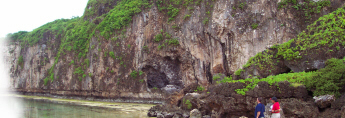Projects
Arsenic in Churchill County, Nevada Domestic Water Supplies
Mark Walker, University of Nevada, Reno
In Churchill County, Nevada, arsenic concentrations in shallow, domestic wells exceed the standards set to protect public health in about 85% of groundwater sources sampled. The Churchill County office of University of Nevada Cooperative Extension is developing a comprehensive response to community concerns and inquiries through a senior volunteer program, Nevada G.O.L.D. (Guarding Our Local Drinking Water).
Read More >>
CONTACT
Mark Walker
Phone: 775-784-1938
Fax: 775-784-4789
Email: mwalker@cabnr.unr.edu
Water Quality Interpreter: An Interactive Web Site
Mark Walker, University of Nevada, Reno
R. Moore
The project is in response to questions from homeowners, especially those served by their own wells, about how to interpret reports from water quality tests.
Read More >>
WEBSITE: http://www.ag.unr.edu/water/interpreter/
CONTACT
Mark Walker
Phone: 775-784-1938
Fax: 775-784-4789
Email: mwalker@cabnr.unr.edu
Private Well Owner Education
Kitt Farrell-Poe, University of Arizona in Yuma
Produce new fact sheets and update previously published fact sheets using science-based information to assist private well owners in maintaining the safety and quality of their drinking water.
Read More >>
CONTACT
Kitt Farrell-Poe
Phone: 520-621-7221
Fax: 520-621-3963
Email: kittfp@ag.arizona.edu
Water Quality Survey on the Navajo Nation
Marnie Carroll, Diné College
Mark Walker, University of Nevada, Reno
The objectives included: 1) Collect samples from unregulated water supplies to evaluate chemical and microbiological quality of water, 2) Work collaboratively with students and faculty from Diné College, in Shiprock, NM.
Read More >>
CONTACT:
Marnie Carroll
Phone: 505-368-3556
Fax: 505-368-3550
Email: mkcarroll@dinecollege.edu
Shock Chlorination: Use of Chlorine Test Strips as Indicators of Completed Purging
Mark Walker, University of Nevada, Reno
Ralph Seiler, USGS
This project involved shock chlorinating wells to look for disinfection byproducts and metals and to track concentrations of both during purging.
Read More >>
CONTACT
Mark Walker
Phone: 775-784-1938
Fax: 775-784-4789
Email: mwalker@cabnr.unr.edu
Detection of Leptospira in Water
Mark Walker, University of Nevada, Reno
Carl Evensen, University of Hawaii
Project objectives: To develop a method to detect spirochetes of pathogenic Leptospira spp. in natural water samples.
Read More >>
CONTACT
Mark Walker
Phone: 775-784-1938
Fax: 775-784-4789
Email: mwalker@cabnr.unr.edu
Carl Evensen
Phone: 808-956-8825
Fax: 808-956-6539
Email: evensen@hawaii.edu
Evaluation of a Method to Detect Leptospira in Water: Preliminary Results from a Regional Collaboration
Ilima Hawkins and Carl Evensen, University of Hawaii
Mark Walker, University of Nevada, Reno
Detecting leptospires in environmental waters is technically difficult. Although independent studies have had success with DNA-based tests and selective culturing, the general performance of these procedures have not been evaluated, and no standardized protocol exists. Effective management approaches require environmental testing to identify and monitor contaminated waters. This is of special importance for American Samoa, where the disease is still new and the full impact may not yet be felt.
Read More >>
CONTACT
Carl Evensen
Phone: 808-956-8825
Fax: 808-956-6539
Email: evensen@hawaii.edu
Onsite Wastewater Education Program
Kitt Farrell-Poe, University of Arizona in Yuma
The objectives of the Onsite Wastewater Education program are to empower the users, installers, maintainers, and regulators of onsite wastewater treatment and dispersal systems to make wise choices to protect human health and the environment.
Read More >>
CONTACT
Kitt Farrell-Poe
Phone: 520-621-7221
Fax: 520-621-3963
Email: kittfp@ag.arizona.edu
Septic System Installation Comic Book
Kitt Farrell-Poe, University of Arizona in Yuma
Craig Runyan, and Adrian Hanson, New Mexico State University
Bruce Lesikar, Texas A&M University
The project adapted appropriate existing materials to develop detailed guidelines to owner-installed septic systems. The format was a conventional comic book style, with cartoon characters illustrating a step-by-step procedure for properly designing and installing the system. English and Spanish versions of the comic book were printed.
Read More >>
CONTACT
Kitt Farrell-Poe
Phone: 520-621-7221
Fax: 520-621-3963
Email: kittfp@ag.arizona.edu



